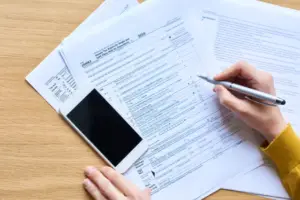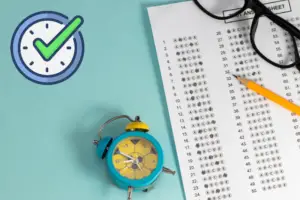Do you have an examination around the corner? This article contains information on how you can beat anxiety and stress during examinations.

They say that one of the signs of being in love with a person is the strange butterfly feelings in our stomach, but if you ask me, examination is strong enough to make some of us mistake anxiety for butterfly feelings.
As a student and one who has written a series of examinations, no matter my level of preparation for exams, anxiety always sets in at one point or the other. Just like me, most people suffer some degree of anxiety when preparing for an examination.
Examination anxiety [5] refers to the nervousness you might feel just before or during an exam.
This can range from a mild nervous feeling to a full panic attack. In other people, stress and anxiety during exams may cause racing heart beats, sweaty palms, etc. There are numerous reasons why people feel this way during examinations. But whatever the reason may be, exam anxiety is normal and common too, but if not properly managed, it may result in poor performance.
Therefore, when faced with anxiety and stress during examination, it is important to look for ways to curb it. Fortunately, there are several steps you can take to reduce anxiety and stress during examinations.
How to Beat Anxiety and Stress During An Examination
Here are ways you can beat anxiety and stress during examinations:
1. Study and Prepare For Exams in Time

Although examination anxiety is common in all and for all examinations, people who did not study and prepare for the examination tend to feel more stressed and anxious during the exam than those who actually studied for the examination.
Bearing this in mind, one effective way to beat anxiety during exam is to prepare and study thoroughly before the exam. If you have studied your material, you are less likely to feel panicked or stressed on the day of the test.
You won’t have to break your head thinking about the questions to possibly expect because, regardless of how the questions come, you should be able to answer without feeling intimidated
2. Stay Active
Your ability to beat anxiety during examinations is an accumulation of the things you did before the examination, not just the things you do during the examination.
Exercise is a great way to reduce anxiety. It is known to release endorphins that will elevate your mood. Exercise tends to distract your mind from the exam, so your brain will have a chance to relax and refresh itself. It doesn’t need to be a strenuous exercise.
- Activities like
- Jogging,
- Skipping,
- Biking and lots more are enough to relax your nerves for the examination.
3. Get Enough Sleep the Night Before

A lot of times, students who study round the clock for examinations tend to perform badly in examinations. This is not the work of your village uncles, neither is it because you didn’t do your best. The problem lies in not getting adequate rest.
While studying can make plenty of difference in your score, quality rest is important too. The mistake a lot of people make is studying throughout the night for an examination scheduled the next morning. The downside to this is that it increases anxiety.
According to Stanford Medicine [4], Sleep deprivation increases the likelihood of having a poor grade.
Sleep deprivation is another cause of exam anxiety. Hence, to overcome this durit exam, commit to getting a full 8 hours of sleep especially a night before the exam.. This will ensure that your brain has been properly rested.
4. Get To The Exam Location Early
There are higher chances that anxiety may get a better part of you when you rush into the exam hall at the eleventh hour.
Results have shown that most people who arrive at the exam venue hours before the exam experience little or no stress and anxiety during the exam. However, being late can make a stressful situation even more difficult.
If your test is timed, you may feel extra pressure trying to answer all of the questions before the clock runs out.
One of the disadvantages of arriving late to an exam venue includes scrambling to get to the right location, in situations where the exact venue is not known. Where it is the case, you will most likely carry that anxiety and stress into the exam with you.
So, to beat anxiety and stress, park everything [6] you need for the exam the previous night and set out to the exam location early to prevent these issues. Moreso, it gives you time to transition from your everyday headspace to “exam mode.”
5. Read All Instructions And Questions Carefully

According to the Princeton review [1] “there is nothing worse than putting time into a question and realizing you are not solving for x”. That singular scenario can destabilize a lot of people during examination
A lot of times, when you are stressed during an exam, you may rush through the exam. By doing this, there is a high probability that you may miss something crucial and get some questions wrong.
By reading all instructions carefully, you can be confident that you understand what to do and can complete the test correctly.
This feeling of confidence and understanding what you are required to do is an anxiety antidote.
6. Put Negative Thoughts Aside
It is very normal to have a rush of negative thoughts during an exam. It is that time so many “what ifs” get to flood your thoughts. For example, what if I fail this exam? What if I don’t answer all the questions, etc. Even if you have never failed exams in the past, these thoughts will come but they only contribute to increased self doubt, thereby increasing your level of anxiety.
Since it’s already established that you have never failed an exam in the past, go on with that mindset.
As long as you have studied effectively, there shouldn’t be anything new or too difficult for you to deal with. According to Reed Business School [7], “when it comes to exams, having that positive mindset before you go into the room will help you feel at ease and more able to approach questions productively.” So, a positive mindset is as important as your writing materials. It helps you to beat anxiety during exams.
7. Watch The Clock
 It is normal to get carried away while writing an exam and end up losing track of time. Realizing that time is almost up and there are lots of unattempted questions can increase your level of anxiety to the peak, thus making it hard for you to concentrate on doing anything useful in those final minutes.
It is normal to get carried away while writing an exam and end up losing track of time. Realizing that time is almost up and there are lots of unattempted questions can increase your level of anxiety to the peak, thus making it hard for you to concentrate on doing anything useful in those final minutes.
To avoid being taken unawares, it is best to keep track of time. You may not be allowed access to a mobile phone. A wrist watch comes in handy for this purpose.
8. Take A Deep Breathe
Diaphragmatic breathing can be particularly helpful for easing anxiety and stress, according to Healthline [3].
Diaphragmatic breathing is a breathing exercise sometimes called belly breathing or abdominal breathing that helps strengthen your diaphragm, an important muscle that enables you to breathe.
Slowing down your breathing can help reduce your heart rate, lower your blood pressure, and let your body know it’s time to relax.
So, whenever you feel a rush of anxiety during an exam, stop, close your eyes and take a deep breath. Repeat the process until you feel relaxed enough to proceed with the exam.
Breathing [2] can be a powerful tool to soothe anxiety.
Conclusion
Having anxiety or feeling stressed during exams is normal especially if you didn’t prepare thoroughly for it. However, how you choose to deal with it is what makes the difference between you and the next person.
If you are able to apply the measures mentioned in this article, you will be less stressed during exams.
When next you have an exam, prepare ahead of time, get some exercise to relax your nerves, get enough sleep the night before the exam, arrive at the exam venue in time, follow instructions, keep a positive mindset, etc. These and more, will help you beat anxiety during exams.
References
[1] “10 Ways to Overcome Test Anxiety.” Princetonreview.com, https://www.princetonreview.com/college-advice/test-anxiety. Accessed 29 Mar. 2023. Jewell, Tim, and Crystal Hoshaw.
[2] “Diaphragmatic Breathing: Exercises, Techniques, and More.” Healthline, 25 Sept. 2018, https://www.healthline.com/health/diaphragmatic-breathing.
[3] “Swaim, Emily. “How to Overcome Test Anxiety: 8 Tips to Try.” Healthline, 9 Mar. 2022, https://www.healthline.com/health/how-to-overcome-test-anxiety.
[4] “The Effects of Sleep Deprivation.” Seisen.com, 22 Jan. 2020, https://www.seisen.com/student-life/seisen-post/features/~board/seisen-post/post/the-effects-of-sleep-deprivation.
[5] Weiss, Elizabeth. “How to Deal with Exam Anxiety.” WikiHow, 11 Jan. 2010, https://www.google.com/amp/s/www.wikihow.com/Deal-With-Exam-Anxiety%3famp=1?espv=1.
[6] “What Every Student Needs for Final Exams.” Princetonreview.com, https://www.princetonreview.com/college-advice/what-every-student-needs-for-final-exams. Accessed 29 Mar. 2023.
[7] “Why Mindset Is Key to Passing Exams.” Reed Business School, 26 May 2016, https://www.reedbusinessschool.co.uk/why-mindset-is-key-to-passing-exams/.
Don’t miss out on current updates, kindly like us on Facebook & follow us on Follow @Eafinder OR leave a comment below for further inquiries.







